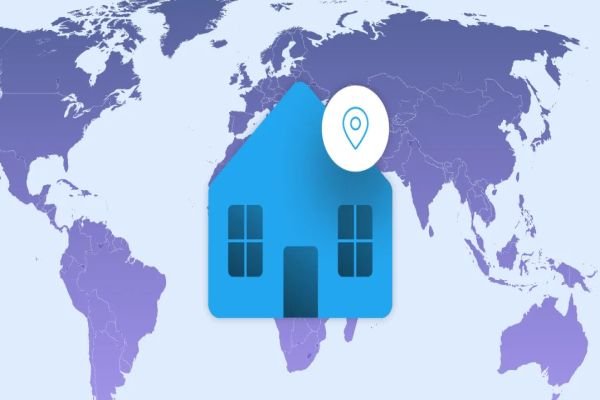Residential rotating proxies are a step above providing true online anonymity. Unlike their common counterpart—the datacenter proxies—residential rotating proxies leave no indication to the internet that their client is using a proxy in the first place. With this come a number of unique benefits that we will discuss in this article.
Let’s start by taking apart the term “residential rotating proxies” to consider how each constituent contributes to its functionality.

What are Residential Proxies?
Residential proxies are intermediary servers that conceal user traffic with ISP-assigned IP addresses, making detection by various anti-bot measures nearly impossible. They possess ISP-assigned IP addresses because the servers are regular household devices specially set up for proxy operations. This is the opposite of datacenter proxies that, as the name suggests, are housed in data centers and receive their IP addresses from the data centers themselves, leaving these proxies vulnerable to detection and IP-range bans.
Residential proxies are particularly useful for activities that require a high degree of anonymity, such as keyword data scraping, managing multiple social media accounts, or accessing geo-restricted content. They provide a more trustworthy and less conspicuous alternative to datacenter proxies, although they often come with a higher cost. Furthermore, using actual residential IPs allows for more accurate testing and scraping of geo-specific content, as they can represent real user behavior and location more accurately.
Static vs. Rotating
On top of IP origin, another layer to internet anonymity depends on how often the masking IP address is changed. For that matter, proxy services typically offer two kinds of IP change behaviors: static and rotating proxies.
- Static proxies provide a fixed, unchanging IP address to the user. Unlike rotating proxies, a static proxy maintains the same IP throughout a session, allowing for consistent online presence and easier temporary whitelisting on websites monitoring IP changes. However, for absolute peace of mind with long-term whitelisting or remote access matters, dedicated proxies are the ideal solution.
- Rotating proxies automatically assign a different IP address from a large pool of IP addresses after a specified amount of time passes. This approach, especially when combined with residential IPs, significantly reduces the risk of detection and IP blocking, making them ideal for web scraping, automated data collection, and managing multiple accounts. These tasks rely on the ability to disperse traffic through different online identities so as not to raise suspicions from the website’s end.
Benefits of Rotating Residential Proxies
Taken separately, the rotating technology and residential proxies aim for enhanced anonymity. Together, they become the go-to tool of business analysts, SEO specialists, marketers and people who yearn for some of the best level of privacy. The most common desired benefits of rotating residential proxies are:
- Web Scraping: Rotating residential proxies are invaluable for collecting publicly available data without being blocked or flagged. Each proxy switch mimics a new, seemingly regular user, circumventing anti-scraping measures like rate limits or IP bans, often targeting suspiciously high request volumes from a single IP.
- E-commerce and Retail: In price monitoring, static IPs can be blocked by competitors’ websites. Rotating proxies avoid this by accessing the site from different IPs, ensuring continuous access to competitor pricing and stock levels for accurate market positioning.
- Online Gaming: Online game platforms often employ restrictions on the use of obfuscating technologies such as proxies or even VPNs. Rotating proxies enable the creation of multiple gaming accounts or accessing region-specific servers without being flagged for suspicious activity, which is often monitored by game servers to prevent fraud or cheating
- Social Media Management: Managing multiple accounts from a single, non-ISP-assigned IP can trigger security protocols leading to account restrictions or bans. Rotating residential proxies help simulate access from multiple individual real-like users, reducing the risk of detection by social media platforms’ security algorithms.
The Shortcomings of Rotating Residential Proxies
Factually, there are two primary drawbacks to rotating residential proxies: their price and connection stability.
- Higher price. Due to their sensitive, undercover nature, residential proxies are shared between a very small number of people when compared to the standard datacenter proxy. This, along with the fact that they are set up on actual household devices rather than on specialized, maintained servers, adds up to the price of their upkeep
- Connection stability. Once again, residential proxies are literally household-device servers, so they are not as efficient at processing massive amounts of traffic. As such, although their secretive nature is ideal against blockers, they tend to take a longer time to harvest data.
Main takeaway
In summary, rotating residential proxies blend the anonymity of residential IPs with the dynamic nature of rotating proxies to offer unparalleled online privacy and versatility. This combination of residential legitimacy and rotating variability makes them a superior choice for a wide range of online activities that require stealth and reliability. So if your demands are placed on reliable, high-grade anonymity—consider looking into residential rotating proxies!
